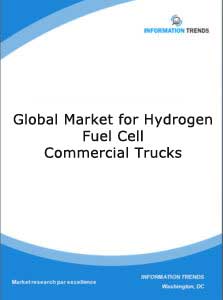
1. Excutive Summary
Well over 800 thousand hydrogen fuel cell trucks and goods-carrying commercial vehicles will
be sold by 2035. These include both heavy-duty trucks as well as light-duty and medium-duty
trucks. Because of their unique characteristics, fuel cell heavy-duty trucks are already
outcompeting similar battery-electric models, particularly for long-haul routes.
There is a particular industry interest in transitioning heavy-duty diesel trucks to zero-emission
because diesel trucks are the biggest contributors to carbon emissions on roadways.
Until the second half of 2020s, battery-electric trucks will remain competitive with fuel cell
medium-duty trucks. Battery-electric trucks will become less competitive as more hydrogen
stations are built and as the prices of fuel cell medium-duty trucks fall.
Smaller battery-electric trucks will have an edge over hydrogen fuel cell trucks until early thirties.
Smaller battery-electric trucks will lose that edge as light-duty fuel cell trucks hit lower price
points and as hydrogen stations become more pervasive.
The biggest impediment to the adoption of hydrogen fuel cell trucks so far has been the cost of
these vehicles. However, several factors have converged to bring the prices of these trucks
down.
Hydrogen fuel cell trucks have several advantages over battery-electric trucks, including the
following:
1. These vehicles are lighter than battery-electric vehicles, making them better suited to
carry heavy cargo.
2. These trucks travel longer distances than battery-electric vehicles, making them better
equipped for long-haul transportation.
3. Hydrogen fuel cell trucks are capable of rapid fueling similar to diesel trucks, unlike time consuming charging of battery-electric trucks.
4. The routes of heavy-duty and medium-duty trucks are mostly predictable which lowers
the barriers to building a hydrogen fueling infrastructure.
In the long-run, hydrogen fuel cell vehicles will dominate the market for trucks and commercial
vehicles.
2. Scope of Report
This is one of the most comprehensive and timely studies on hydrogen fuel cell trucks. It
discusses hydrogen fuel cell truck-maker strategies and provides their in-depth profiles. The
study discuses factors differentiating hydrogen fuel cell trucks from trucks running on other
power sources, and their market impact.
The focus of this study is the commercial hydrogen fuel cell trucks. The study provides an indepth analysis of this emerging market. The study segments the market into light-duty and
medium-duty trucks, and heavy-duty trucks, providing sales and revenue forecasts for major
world regions through 2035 for both segments. The study does not cover buses and passenger
vehicles.
3. Classification of Trucks
In this study, commercial trucks are classified in the following two categories:
• Light-duty trucks and medium-duty trucks
Heavy-duty trucks
Trends would also like to note that the term “new energy vehicles,” as used in this
study, encompasses three types of vehicles: hydrogen fuel cell vehicles, battery-electric
vehicles, and gasoline-electric plug-in hybrid vehicles.
Unless otherwise stated, the term sales, as used in this study, also covers leases.
3.1 Light-Duty Trucks
Light-duty trucks are generally car-sized and may include pick-up trucks, panel trucks, and postal vehicles. Light-duty trucks weigh under 10,000 lb. Under U.S. Federal Highway Administration classification, they are Class 1 and Class 2 trucks.
3.2 Medium-Duty Trucks
Medium-duty trucks are generally used for local deliveries and public services, and may include flatbed trucks, box trucks, dump trucks, tow-trucks, and firetrucks. Medium-duty trucks weigh between 10,001 lb and 26,000 lb. Under U.S. Federal Highway Administration classification, they are Class 3 to Class 6 trucks.
3.3 Heavy-Duty Trucks
Heavy-duty trucks are generally used for long-haul transportation of goods, and may include city transit vehicles, mobile cranes, cement mixers, garbage trucks, tractor trailers, and semi-trailers. Heavy-duty trucks weigh 26,001 and above. Under U.S. Federal Highway Administration classification, they are Class 7 and Class 8 trucks.
Executive Summary
Press Release
Table of Contents
Pre-order with this coupon code "WWQRLTLE" to get $500 discount |





